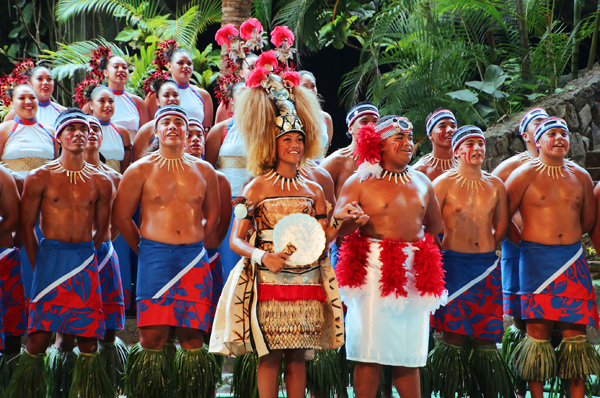
The PCC has also been staging a traditional Samoan cultural arts and practices festival — featuring Samoan and interested high school students from across Oahu — as an important part of the World Fire Knife Championships . . . and to show just how popular this year’s May 9th festival was, the 2,700-seat Pacific Theater venue sold out a week in advance of the event.
For those who couldn’t make it, however, the Center shared a live-stream Internet broadcast of the event.
Pictures, video clips and other coverage are also available on the PCC’s Facebook page: www.facebook.com/polynesia2; additionally, the Olelo Hawaii public access student TV crew from Kahuku High School videotaped the festival for later broadcast.
Here are some of the details and highlights of the Center’s latest high school Samoan cultural arts festival:
As with many Samoan events, this one started with traditional ceremony, including a song from the Fetu Ao Samoan Language School group from Aiea; PCC Samoan villagers dressed in traditional finery; the national anthems of the United States, Samoa and American Samoa; prayer; and a Samoan talking chief welcoming everyone with chiefly oratory.
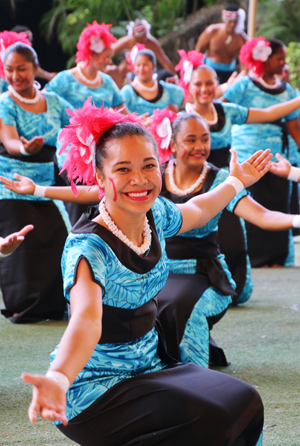
Kapolei High School Students
Next, representatives from the Interscholastic League of Honolulu — the ILH Poly, which represents private high schools in Honolulu, as well as Kapolei, Waipahu and Radford public high schools delivered their own chiefly oratory. Delsa Atoa Moe, PCC Director of Cultural Presentations who co-emceed the event, commended them, and explained that even young people who speak Samoan often do not understand the oratorical form of the language.
Then the fun and excitement began — with the traditional games, including girls, then boys husking mature coconuts (o’a popo) using the traditional mele’i (sharp stick); coconut-leaf basket weaving (lalaga ato); green banana peeling (fofo’e fa’i); and firemaking (si’aga afi). The crowd loved these, cheering on those who quickly completed these challenges, and light-heartedly laughing at those who couldn’t do them. Matuauto Steve Laulu, the PCC’s Islands Director and co-emcee with Delsa, explained these are both ancient and everyday modern activities for many young people in Samoa.
He added that he was very pleased with the progress the students showed in being able to start a fire, starting by literally rubbing two sticks together. “In years past, none of them could do it. This year they all did,” he said.
The Tuto’atasi Dance Group of students from Salt Lake City, Utah, performed traditional songs and dances during intermission; and then the second half began, featuring the local high school groups — plus nearby Kahuku High — performing their own song and dance routines.
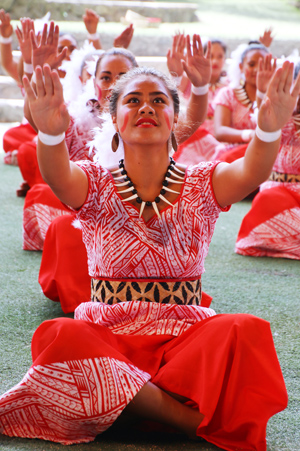
kahuku High School students
It’s hard to understate how enthusiastically the large crowd received each performance. For example, even within customary routines, the students and their instructors were really creative. Of course, the fa’aluma or on-stage director, is expected to be funny — and none of them disappointed the crowd; but even so, some parts were hilarious.
Costuming throughout was exceptional, and that’s just the students. Then there’s the taupou or young woman in traditional costume who danced the solo taualuga numbers. Custom calls for them to remain calm and graceful, no matter how much others try to distract them. That includes dozens of people coming on stage, in some cases, and showering the dancers with money — it’s also a Samoan custom, and both Moe and Laulu explained all of the money donated went to the respective schools. At the end, the emcees pointed out that 23 years ago the students used to compete in each of the categories, but the event is now a festival best exemplified by the title song (used by permission), “We Are Samoa.”
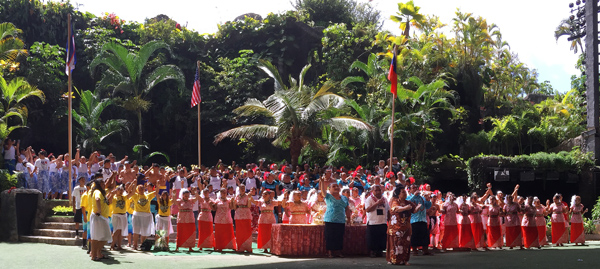
In lieu of prizes, the PCC gives each of the participating high schools an honorarium. They also explained that after more than 20 years of PCC special events, the Samoan festival is the only one that will be continued in the future, because every year the participants and crowds are so excited to participate.
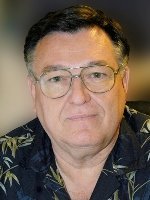
Mike Foley, who has worked off-and-on
at the Polynesian Cultural Center since
1968, has been a full-time freelance
writer and digital media specialist since
2002, and had a long career in marketing
communications and PR before that. He
learned to speak fluent Samoan as a
Mormon missionary before moving to Laie
in 1967 — still does, and he has traveled
extensively over the years throughout
Polynesia and other Pacific islands. Foley
is mostly retired now, but continues to
contribute to various PCC and other media.

Recent Comments